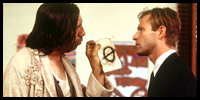
 |
|
Suspect Zero (2004) Cast: Aaron Eckhart, Ben Kingsley, Carrie-Anne Moss, Kevin Chamberlin, Harry Lennix, Julian Reyes, Keith Campbell, Nicole DeHuff, Chloe Russell, Ellen Blake, William Mapother, William B. Johnson, Jerry Gardner, Brady Coleman 2004 – 100 minutes Rated: Reviewed by Dustin Putman, August 25, 2004.  Credit director E. Elias Merhige (2000's "Shadow of the Vampire") for aspiring to create a film within the serial killer genre that wavers occasionally from the beaten path. "Suspect Zero," a psychological thriller in the mold of 1991's "Silence of the Lambs" and 1995's "Se7en" without ever coming off as a carbon copy, is not one of the best of its kind, but is easily superior to recent duds like "Twisted" and "Taking Lives." And while the plotting doesn't exactly reinvent the wheel, it does skew conventions enough to leave the viewer edgy and wondering what will unfold with each progressive scene.
Credit director E. Elias Merhige (2000's "Shadow of the Vampire") for aspiring to create a film within the serial killer genre that wavers occasionally from the beaten path. "Suspect Zero," a psychological thriller in the mold of 1991's "Silence of the Lambs" and 1995's "Se7en" without ever coming off as a carbon copy, is not one of the best of its kind, but is easily superior to recent duds like "Twisted" and "Taking Lives." And while the plotting doesn't exactly reinvent the wheel, it does skew conventions enough to leave the viewer edgy and wondering what will unfold with each progressive scene.
 For sticky reasons that gradually become clear, FBI agent Thomas Mackelway (Aaron Eckhart) has just relocated to the dusty New Mexico town of Albuquerque, where he is promptly put on the case of a suspected serial killer who leaves a crossed-out zero at the scenes of the crimes. Aiding in his investigation is ex-girlfriend and fellow agent Fran Kulok (Carrie-Anne Moss). The two come to discover that the alleged murderer of these men—Benjamin O'Ryan (Ben Kingsley)—is actually offing other serial killers across the country, including his latest target, a truck driver who has been abducting children for years. Still, Mackelway suspects that something else is going on, and for reasons he isn't sure of, when he starts receiving foreboding messages in the mail from O'Ryan.
For sticky reasons that gradually become clear, FBI agent Thomas Mackelway (Aaron Eckhart) has just relocated to the dusty New Mexico town of Albuquerque, where he is promptly put on the case of a suspected serial killer who leaves a crossed-out zero at the scenes of the crimes. Aiding in his investigation is ex-girlfriend and fellow agent Fran Kulok (Carrie-Anne Moss). The two come to discover that the alleged murderer of these men—Benjamin O'Ryan (Ben Kingsley)—is actually offing other serial killers across the country, including his latest target, a truck driver who has been abducting children for years. Still, Mackelway suspects that something else is going on, and for reasons he isn't sure of, when he starts receiving foreboding messages in the mail from O'Ryan.
 Written by Zak Penn (2001's "Behind Enemy Lines"), "Suspect Zero" is notably more quiet and ruminative than the average serial killer thriller, following the journey Thomas Mackelway goes on in his attempt to solve the mystery of the murders and figure out what connection he shares—if any—with the killer. Director E. Elias Merhige intentionally strips the characters of any joy and the story of any visceral release. Even the climactic action sequence—its only one—is low-key and subdued, free of cliched, big-movie heroics, and the soundtrack screeching out precisely when one would expect it to take off. In these characteristics, the film resembles 2001's vastly underrated "The Pledge," directed by Sean Penn and starring Jack Nicholson as a retired detective whose final, unsolved case comes back to haunt him.
Written by Zak Penn (2001's "Behind Enemy Lines"), "Suspect Zero" is notably more quiet and ruminative than the average serial killer thriller, following the journey Thomas Mackelway goes on in his attempt to solve the mystery of the murders and figure out what connection he shares—if any—with the killer. Director E. Elias Merhige intentionally strips the characters of any joy and the story of any visceral release. Even the climactic action sequence—its only one—is low-key and subdued, free of cliched, big-movie heroics, and the soundtrack screeching out precisely when one would expect it to take off. In these characteristics, the film resembles 2001's vastly underrated "The Pledge," directed by Sean Penn and starring Jack Nicholson as a retired detective whose final, unsolved case comes back to haunt him.
 What "Suspect Zero" does have, in spades, is a keen sense of innate foreboding, rattling tension out of moments of meticulously graphed quiescence and isolation. The cinematography of its desert New Mexico setting, by Michael Chapman (2000's "The Watcher"), is sharp and brooding, taking on an eerily solemn beauty. And, unlike most thrillers of its kind, the biggest question mark on the characters and viewers' minds is not who the perpetrator is, but why he is committing the crimes. Adding depth to the story is the intriguing subject of 'remote viewing,' a sort of trained version of ESP that makes for some visually sprightly material, as well as the mystery surrounding O'Ryan's connection with Mackelway, and the source of the visions and headaches that both of them are experiencing. The trailers and TV spots foolishly give away too much—they plainly spell out that the film is about a serial killer hunting down other serial killers—but, fortunately, there are more plot developments and revelations once this particular mystery is uncovered.
What "Suspect Zero" does have, in spades, is a keen sense of innate foreboding, rattling tension out of moments of meticulously graphed quiescence and isolation. The cinematography of its desert New Mexico setting, by Michael Chapman (2000's "The Watcher"), is sharp and brooding, taking on an eerily solemn beauty. And, unlike most thrillers of its kind, the biggest question mark on the characters and viewers' minds is not who the perpetrator is, but why he is committing the crimes. Adding depth to the story is the intriguing subject of 'remote viewing,' a sort of trained version of ESP that makes for some visually sprightly material, as well as the mystery surrounding O'Ryan's connection with Mackelway, and the source of the visions and headaches that both of them are experiencing. The trailers and TV spots foolishly give away too much—they plainly spell out that the film is about a serial killer hunting down other serial killers—but, fortunately, there are more plot developments and revelations once this particular mystery is uncovered.
 Primarily a three-character ensemble (the rest of the supporting cast is tangential, at most), the performances from Aaron Eckhart (2003's "Paycheck") and Carrie-Anne Moss (2003's "The Matrix Reloaded") are proficient without standing out. Although Eckhart's Mackelway is the protagonist, he is flawed and far from heroic; because there are doubts about who he really is and shady circumstances surrounding his past, it is difficult to outwardly like and get behind him. Moss' Fran Kulok is more thankless; she doesn't serve much purpose to the story, and seems to be on hand simply because there calls for a token female sidekick. Ben Kingsley (2003's "House of Sand and Fog"), redeeming himself after the lousy "Thunderbirds," is the real star of the picture, going far and beyond the call of duty to bring surprising layers of pathos to his enigmatically threatening Benjamin O'Ryan.
Primarily a three-character ensemble (the rest of the supporting cast is tangential, at most), the performances from Aaron Eckhart (2003's "Paycheck") and Carrie-Anne Moss (2003's "The Matrix Reloaded") are proficient without standing out. Although Eckhart's Mackelway is the protagonist, he is flawed and far from heroic; because there are doubts about who he really is and shady circumstances surrounding his past, it is difficult to outwardly like and get behind him. Moss' Fran Kulok is more thankless; she doesn't serve much purpose to the story, and seems to be on hand simply because there calls for a token female sidekick. Ben Kingsley (2003's "House of Sand and Fog"), redeeming himself after the lousy "Thunderbirds," is the real star of the picture, going far and beyond the call of duty to bring surprising layers of pathos to his enigmatically threatening Benjamin O'Ryan.
 "Suspect Zero" ends underwhelmingly, not adding up to as much as one is lead to anticipate, but remains admirable in its smart avoidance of a predictable fight/shoot-out. Indeed, what transcends the film from its stock genre origins is that the ending is not about whether the "villain" is killed, but about whether he deserves to die at all, and why. The final weekend of August is usually a barren wasteland for cinema, a time when studios dump their black sheep because they have no financial faith in them. "Suspect Zero," a minor achievement but a refreshingly atypical one, nonetheless, can lay claim to not deserving such a dim fate.
"Suspect Zero" ends underwhelmingly, not adding up to as much as one is lead to anticipate, but remains admirable in its smart avoidance of a predictable fight/shoot-out. Indeed, what transcends the film from its stock genre origins is that the ending is not about whether the "villain" is killed, but about whether he deserves to die at all, and why. The final weekend of August is usually a barren wasteland for cinema, a time when studios dump their black sheep because they have no financial faith in them. "Suspect Zero," a minor achievement but a refreshingly atypical one, nonetheless, can lay claim to not deserving such a dim fate.
|
© 2004 by Dustin Putman |














